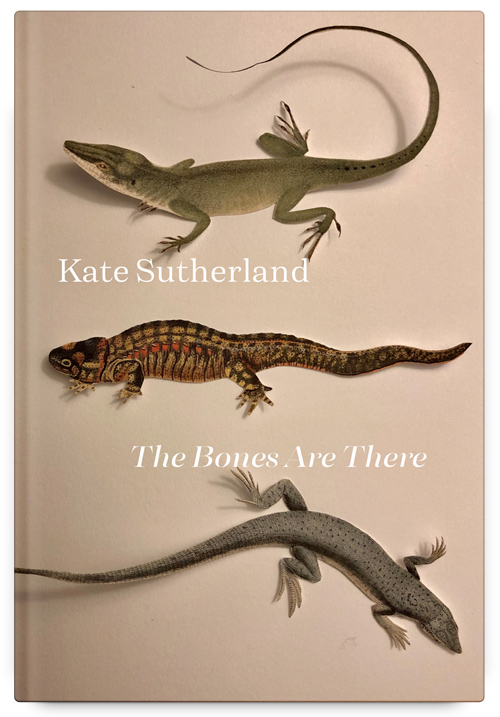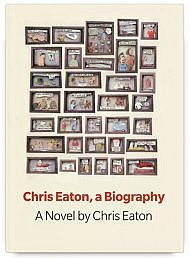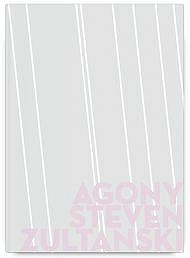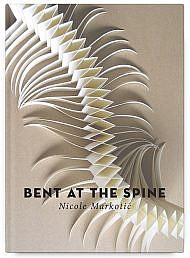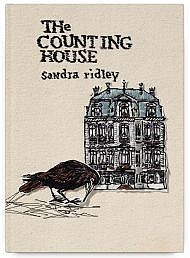Zigzagging across the globe, Kate Sutherland’s fourth book is poetry by way of collage: pieced-together excerpts from travellers’ journals, ships’ logs, textbooks and manuals, individual testimony, even fairy and folk tales that tell stories of extinction—of various species, and of our own understanding of, and culpability within, its process. Across its three sections, Sutherland draws identifiable connections between various animal extinctions and human legacies of imperialism, colonialism, capitalism, and misogyny, charting the ways in which they juxtapose one another while impacting the natural order of things.
As much as it is a critique of humanity’s disastrous effects on this world, The Bones Are There is also a celebration of such incredible creatures, all sadly lost to us. It honours their memory by demanding accountability and encouraging resistance, so that we might stave off future irrevocable loss and preserve what wonders that remain.
Praise for The Bones are There:
“In the poem “Apparatus Required,” a number of scientific instruments required for dissection are listed (scissors, pocket lens, sewing needles, etc.), including, at the end, “a blank notebook.” In Sutherland’s hands, the blank page becomes the sharpest of tools. Sourced from contemporary scientific journals and natural exploration literature dating to long before the word “scientist” was even born, Sutherland presents us inventive collage poems full of the ‘musculature’ of the extinct and the wonders of (re)discovery.” —Madhur Anand, author of This Red Line Goes Straight to Your Heart
“Listen: The Bones Are There is lament. Siren. An alarm clocking witness to pasts fraught with loss in the name of discovery and patriarchy. Lists of extinct species. Legal-case lists of women executed for witchcraft. A list of de-extinction instructions. Lists of syntactic similarities insist the reader sees the correlative imperialist violence of what was—
These bones were found…
These bones were found…
These bones were found…
—not so long ago. With an archivist’s touch and a lawyer’s eagle eye, Kate Sutherland plunders historic texts to rip colonialism asunder.” —a. rawlings
Press Coverage:
Most Anticipated: Our 2020 Fall Poetry Preview —49th Shelf
Beautiful Books: The Bones Are There —All Lit Up
Poetry: Kate Sutherland —Watch Your Head
“[Sutherland] utilizes the archive; not as an end, but as a way in which to examine, articulate and critique. Sutherland writes the ways in which others, from animals to people, particularly women, are victimized through the conquest of capitalism, colonialism and conquest.” —rob mclennan’s blog
A ‘best of’ list of 2020 Canadian poetry books —rob mclennan, dusie
“Expertly crafting scientific and first-hand source material, [Sutherland] calls into clear view the myth making nature of historical “fact” and the efficacy of conservation science when serving a colonial philosophy.” —Conyer Clayton, Arc Poetry Magazine
“The Bones Are There breathes life into the dead. Sutherland reimagines our world as if our ancestors had been less careless and blood thirsty, less intent on their own aggrandizement. It’s a world you need to see.” —Brennan O’Toole, Portal Magazine
Kate Sutherland was born in Scotland, immigrated to Canada as a child, and grew up in Saskatoon. She studied first at the University of Saskatchewan, then at Harvard Law School. She is the author of two collections of short stories, Summer Reading (winner, Saskatchewan Book Award for Best First Book) and All in Together Girls, and the poetry collection, How to Draw a Rhinoceros (shortlisted for a Creative Writing Book Award by the Association for the Study of Literature and the Environment). Her stories and poems have appeared in various magazines and anthologies including Best Canadian Poetry and Best American Experimental Writing. She has done residencies at Hawthornden Castle in Scotland and at the Leighton Artist Studios in Banff. She lives in Toronto where she is a professor and conducts research in the fields of Tort Law, Feminist Legal Theory, and Law and Literature at Osgoode Hall Law School, York University.

